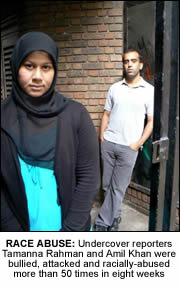Panorama documentary highlights racism on Bristol estate
 TWO Asian reporters working undercover for the BBC’s Panorama programme were subjected to a campaign of vicious racial abuse whilst living on a Bristol housing estate.
TWO Asian reporters working undercover for the BBC’s Panorama programme were subjected to a campaign of vicious racial abuse whilst living on a Bristol housing estate.
The duo, Tamanna Rahman and Amil Khan posed as a married couple and spent two months on a housing estate in the Southmead area of the city as part of the undercover Panorama programme, ‘Hate on the Doorstep’ which will be broadcast tonight.
In shocking scenes the reporters were bullied, attacked and racially-abused more than 50 times in eight weeks.
The duo’s experience was set to test claims made by Trevor Phillips, head of the Equality and Human Rights Commission, that having neighbours of a different ethnic background was no longer an issue in modern Britain when compared to other countries.
But using secret camera’s the couple recorded unsightly racial and physical abuse directed at them from unwelcoming neighbours.
The duo were frequently called “Paki” and “Taliban”, and at other times physically abused.
“On my second day on the estate I had a rock thrown towards me as I returned from a shopping trip. I was called “Paki” and had obscenities muttered at me as I walked by. This from people who knew nothing about me,” Tamanna Rahman said.
She added during the course of the investigation she had glass, a can, bottle and stones thrown at her, and was almost mugged three times and threatened with a brick.
In another shocking incident undercover partner Amil Khan was punched in the back of the head. After being told he was not allowed to walk on the pavement, Khan’s attacker attacked him from behind before being told “Bye, bye Paki”.
A good deal of the abuse on the estate is shown to come from children and teenagers, although adults are also involved.
Rahman said she found it hard to leave her flat for fear of what would happen to her if she did.
“There is little sense of a mixed community in Southmead and the longer I stayed the more I realised why,” Rahman said.
“The more abuse I received, the less I wanted to go out. The more racism I faced, the less I wanted to talk to anybody. I do not think that I was alone in my feelings.
“I feel strongly that neighbourliness is a two-way street, but why would anybody attempt to go out of their way to get to know the community they have moved into, if that community has made you feel unwelcome for no reason but the colour of your skin?
“If you are a non-English speaker, what incentive would you have to learn the language if the vast majority of communication you are likely to experience is abusive?”
Speaking ahead of the tonight’s broadcast; Rahman said her experience had left her more wary of being racially targeted in her hometown of Manchester, even though such fears had rarely crossed her mind before.
“I have been back in Manchester for a few months now, but I still brace myself for trouble whenever I see groups of boys on bikes or teenagers on street corners,” she admits. “Even though the children of Manchester have never had a problem with me, it has now become instinctive.
“One of the worst effects was the lack of trust I felt towards anybody and the sense that I must always be on my guard – even if it was just popping to the shops.”
Panorama – Undercover: Hate on the Doorstep, BBC One, Monday, 19 October at 2030BST.





































